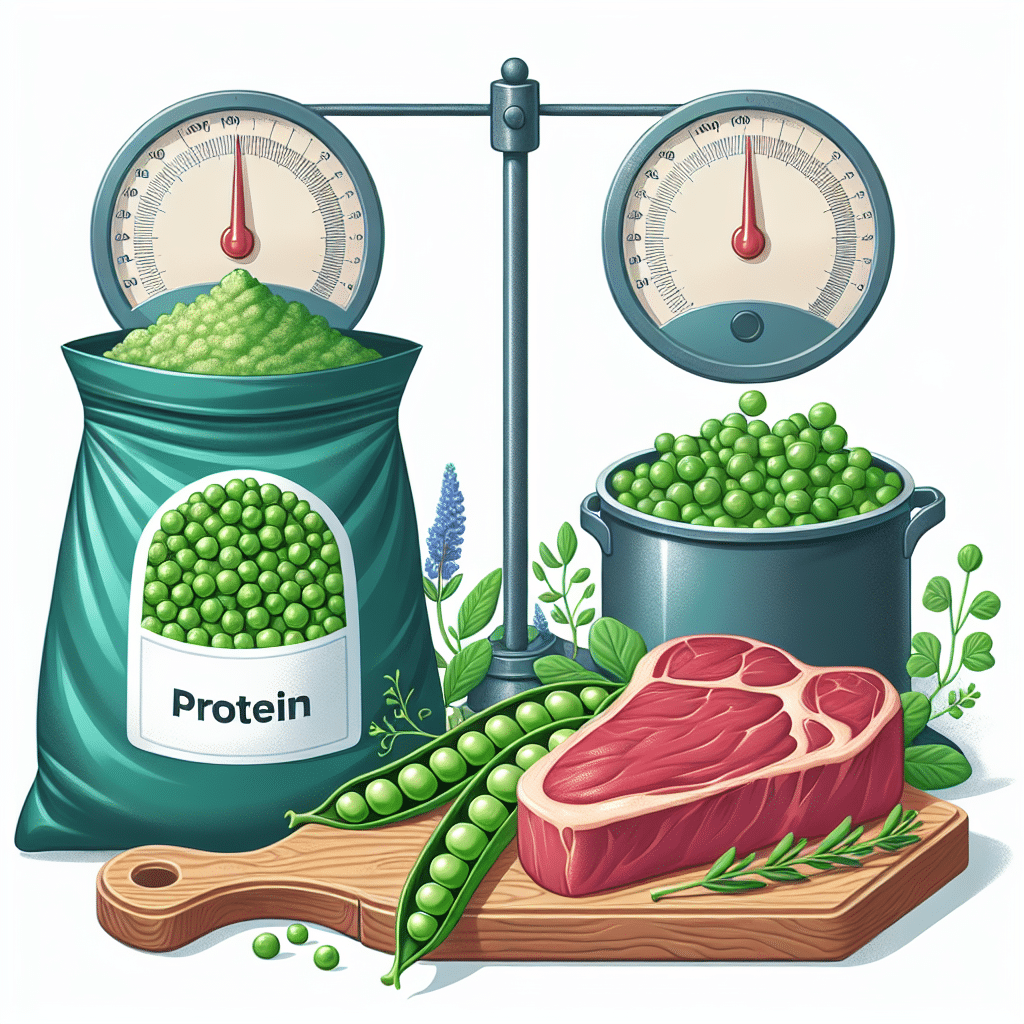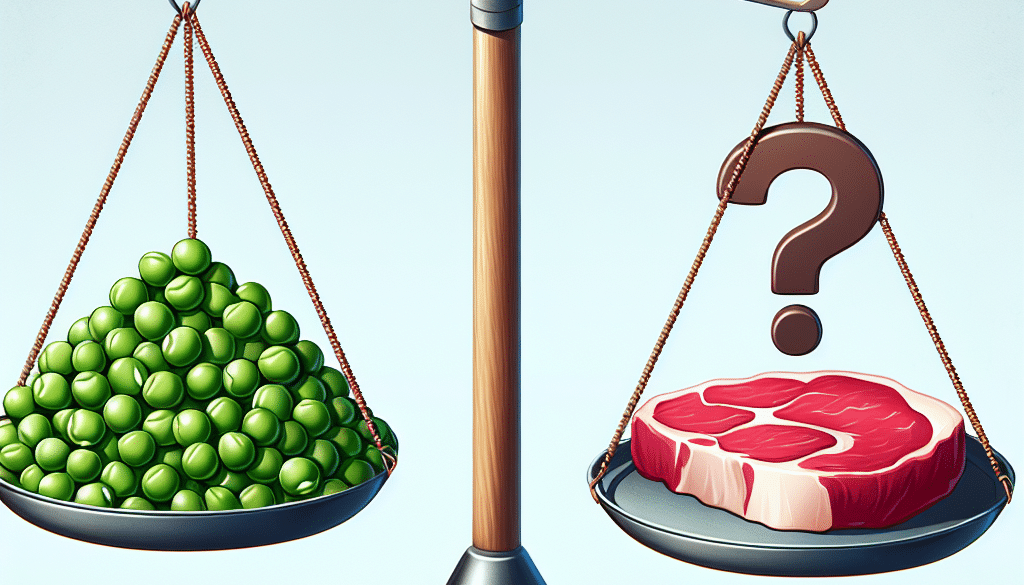Is Pea Protein Better Than Animal Protein?
-
Table of Contents
- Pea Protein vs. Animal Protein: A Comprehensive Comparison
- Nutritional Profile: Pea Protein vs. Animal Protein
- Environmental Impact: Sustainability of Protein Sources
- Digestibility and Absorption
- Health Implications
- Case Studies and Statistics
- Conclusion: Balancing the Protein Scale
- Discover ETprotein’s Premium Protein Products
Pea Protein vs. Animal Protein: A Comprehensive Comparison

Protein is a crucial macronutrient that plays a vital role in building muscle, repairing tissue, and producing enzymes and hormones. With the rise of plant-based diets and sustainable eating practices, pea protein has emerged as a popular alternative to traditional animal protein sources. This article delves into the debate of whether pea protein is better than animal protein, examining various factors such as nutritional value, environmental impact, digestibility, and health implications.
Nutritional Profile: Pea Protein vs. Animal Protein
When comparing pea protein to animal protein, it’s essential to consider their nutritional profiles. Animal proteins, such as meat, dairy, and eggs, are known for being complete protein sources, meaning they contain all nine essential amino acids that the body cannot produce on its own. Pea protein, derived from yellow split peas, is also rich in essential amino acids, though it has lower amounts of methionine.
- Amino Acid Content: While animal proteins typically have a more balanced amino acid profile, pea protein is particularly high in branched-chain amino acids (BCAAs), which are crucial for muscle building and recovery.
- Fiber: Pea protein offers the added benefit of fiber, which is absent in animal proteins. Fiber aids in digestion and can help maintain a healthy weight.
- Fat Content: Animal proteins often come with higher levels of saturated fats, whereas pea protein is low in fat and contains no cholesterol, making it a heart-healthy option.
Environmental Impact: Sustainability of Protein Sources
The production of pea protein is generally considered to be more environmentally sustainable than that of animal protein. The cultivation of peas requires less water and land and produces fewer greenhouse gas emissions compared to raising livestock.
- Water Usage: Livestock farming is a significant consumer of water, whereas peas can grow in a variety of climates and often require less irrigation.
- Greenhouse Gas Emissions: Animal agriculture is a major contributor to methane and other greenhouse gases, while pea cultivation has a much smaller carbon footprint.
- Land Use: Growing peas for protein uses less land per gram of protein produced compared to raising animals for meat.
Digestibility and Absorption
Digestibility is a key factor in determining the quality of a protein source. Animal proteins are known for their high digestibility, but pea protein also boasts a high digestibility score, making it an efficient source of amino acids for the body.
- Protein Digestibility-Corrected Amino Acid Score (PDCAAS): This score is a standard measure of protein quality. Both animal and pea proteins score highly, indicating that they are well-digested and absorbed.
- Allergenic Potential: Pea protein is hypoallergenic, making it a suitable option for individuals with allergies to dairy, eggs, or meat.
Health Implications
Choosing between pea and animal protein may also depend on individual health goals and concerns. Here are some health aspects to consider:
- Heart Health: Pea protein’s low fat and cholesterol-free profile may be beneficial for heart health, while some animal proteins can be high in saturated fats and cholesterol.
- Weight Management: The fiber content in pea protein can promote satiety and aid in weight management, whereas animal proteins may be more calorie-dense.
- Disease Risk: Some studies suggest that high consumption of red and processed meats is associated with an increased risk of certain diseases, while plant-based proteins like pea protein may reduce these risks.
Case Studies and Statistics
Research comparing the effects of pea protein and animal protein on muscle growth, weight loss, and health outcomes provides valuable insights:
- A study published in the Journal of the International Society of Sports Nutrition found that pea protein supplementation was just as effective as whey protein for muscle thickness gains in athletes.
- Statistics show that the global demand for pea protein is rising, with the market expected to reach $176 million by 2025, indicating a growing preference for plant-based protein sources.
Conclusion: Balancing the Protein Scale
In conclusion, both pea protein and animal protein have their unique advantages and can be part of a balanced diet. Pea protein offers environmental benefits, is hypoallergenic, and supports heart health, while animal protein provides a complete amino acid profile and is highly digestible. The choice between the two may come down to personal dietary preferences, ethical considerations, and specific health goals.
Discover ETprotein’s Premium Protein Products
If you’re looking to incorporate high-quality pea protein into your diet, ETprotein offers a range of organic bulk vegan proteins that cater to various needs. Their pea protein products are characterized by a neutral taste, non-GMO, and allergen-free attributes, ensuring you receive the best plant-based protein available.
ETprotein’s commitment to sustainability and quality makes them a top choice for those seeking environmentally friendly and health-conscious protein options. Whether you’re a distributor, trader, or manufacturer, ETprotein can meet your protein requirements with their extensive product range.
For more information or to sample ETprotein’s products, please contact them at sales(at)ETprotein.com today.
About ETprotein:
ETprotein, a reputable protein and L-(+)-Ergothioneine (EGT) Chinese factory manufacturer and supplier, is renowned for producing, stocking, exporting, and delivering the highest quality organic bulk vegan proteins and L-(+)-Ergothioneine. They include Organic rice protein, clear rice protein, pea protein, clear pea protein, watermelon seed protein, pumpkin seed protein, sunflower seed protein, mung bean protein, peanut protein, and L-(+)-Ergothioneine EGT Pharmaceutical grade, L-(+)-Ergothioneine EGT food grade, L-(+)-Ergothioneine EGT cosmetic grade, L-(+)-Ergothioneine EGT reference grade and L-(+)-Ergothioneine EGT standard. Their offerings, characterized by a neutral taste, non-GMO, allergen-free attributes, with L-(+)-Ergothioneine purity over 98%, 99%, cater to a diverse range of industries. They serve nutraceutical, pharmaceutical, cosmeceutical, veterinary, as well as food and beverage finished product distributors, traders, and manufacturers across Europe, USA, Canada, Australia, Thailand, Japan, Korea, Brazil, and Chile, among others.
ETprotein specialization includes exporting and delivering tailor-made protein powder and finished nutritional supplements. Their extensive product range covers sectors like Food and Beverage, Sports Nutrition, Weight Management, Dietary Supplements, Health and Wellness Products, and Infant Formula, ensuring comprehensive solutions to meet all your protein needs.
As a trusted company by leading global food and beverage brands and Fortune 500 companies, ETprotein reinforces China’s reputation in the global arena. For more information or to sample their products, please contact them and email sales(at)ETprotein.com today.












